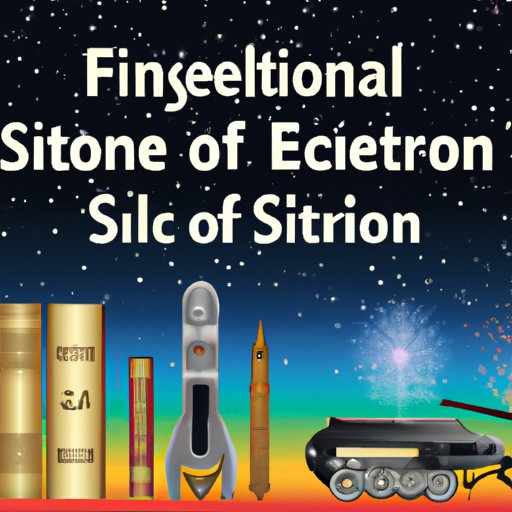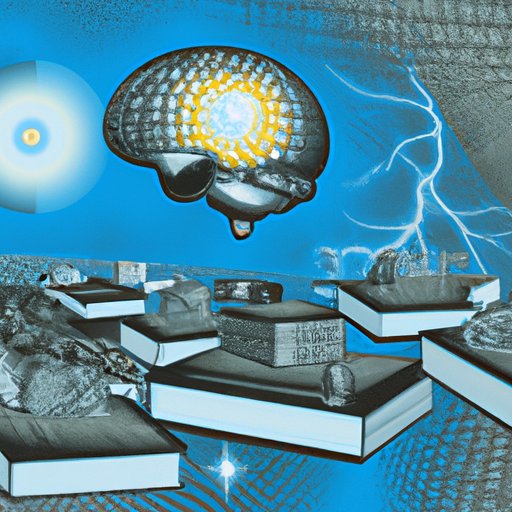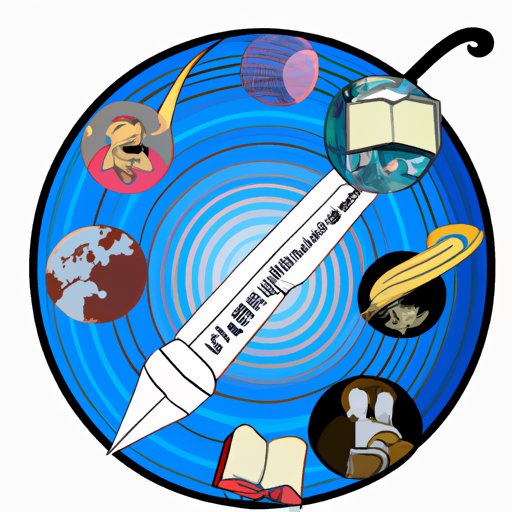Introduction: Exploring the Definition of Science Fiction
Science fiction is a genre of speculative fiction that explores the potential consequences of scientific and technological advances. It often features imaginative and futuristic settings, as well as advanced technology and extraordinary characters.
In this article, we will explore the history and origins of science fiction, common themes found in the genre, its impact on pop culture, influential science fiction authors, the differences between science fiction and fantasy, and the various subgenres of science fiction.

History and Origins of Science Fiction
The roots of science fiction can be traced back to ancient times. Ancient Greek myths, such as Prometheus, feature elements of science fiction, such as the creation of mankind from clay or the use of technology to create artificial life.
The first modern science fiction novel was Mary Shelley’s Frankenstein, published in 1818. This book explored the potential consequences of playing God and creating life from dead matter. From then on, science fiction has been a popular genre, with authors such as Jules Verne and H.G. Wells exploring the implications of new technologies and scientific discoveries.
Today, science fiction continues to be a popular genre, with authors such as Andy Weir, Ernest Cline, and Margaret Atwood exploring the potential implications of current and future scientific developments.

Common Themes in Science Fiction
One of the most common themes in science fiction is the exploration of social questions. Science fiction authors often use their stories to explore issues such as the morality of artificial intelligence, the dangers of genetic engineering, and the consequences of unchecked scientific progress.
Another common theme in science fiction is the examination of current events. Science fiction authors often use their stories to comment on current affairs, such as climate change, immigration, and economic inequality. By using elements of science fiction, authors are able to explore these issues in a unique and thought-provoking way.

Impact of Science Fiction on Pop Culture
Science fiction is one of the most popular genres in pop culture. Films such as Blade Runner, The Matrix, and Avatar have become classics, while television shows such as Doctor Who and Star Trek have achieved cult status. Science fiction books, such as The Hitchhiker’s Guide to the Galaxy and 1984, have become global bestsellers.
The influence of science fiction can also be seen in other genres. For example, many fantasy novels, such as Harry Potter and The Lord of the Rings, contain elements of science fiction, such as magic and advanced technology.
Influential Science Fiction Authors
Many of the most influential authors in the genre of science fiction have made significant contributions to the genre. Isaac Asimov, for example, wrote numerous short stories and novels exploring the potential consequences of advanced technology and artificial intelligence. Philip K. Dick is another influential author, whose work often explored themes of identity and reality.
These authors have had a profound impact on the genre of science fiction, inspiring countless other authors and influencing popular culture and current events. As noted by author Stephen Baxter, “The science fiction of today is the mainstream literature of tomorrow.”
Differences Between Science Fiction and Fantasy
Although science fiction and fantasy are often grouped together, they are two distinct genres. Science fiction typically involves stories set in the future, featuring advanced technology and exploring the potential consequences of scientific and technological developments. Fantasy, on the other hand, typically involves stories set in the past or present, featuring magical elements and exploring mythical creatures and magical powers.
Despite the differences between the two genres, there are similarities. Both genres often explore themes of good and evil, heroism and villainy, and destiny and free will. Additionally, both genres often feature characters that must confront difficult moral choices and grapple with complex ethical dilemmas.
Subgenres of Science Fiction
Science fiction is a vast and varied genre, with many different subgenres. These include cyberpunk, steampunk, space opera, alternate history, post-apocalyptic, and hard science fiction. Each of these subgenres has its own unique appeal, as well as its own distinctive style and tone.
The popularity of each subgenre varies from time to time. For example, cyberpunk was immensely popular in the 1980s and 1990s, while steampunk has become increasingly popular in recent years.
Conclusion: Summarizing the Key Points Covered
In this article, we have explored the world of science fiction, examining its history and origins, common themes, impact on pop culture, influential authors, differences from fantasy, and subgenres. We have seen how science fiction has evolved over time, as well as how it continues to be a relevant and influential genre in popular culture.
(Note: Is this article not meeting your expectations? Do you have knowledge or insights to share? Unlock new opportunities and expand your reach by joining our authors team. Click Registration to join us and share your expertise with our readers.)
